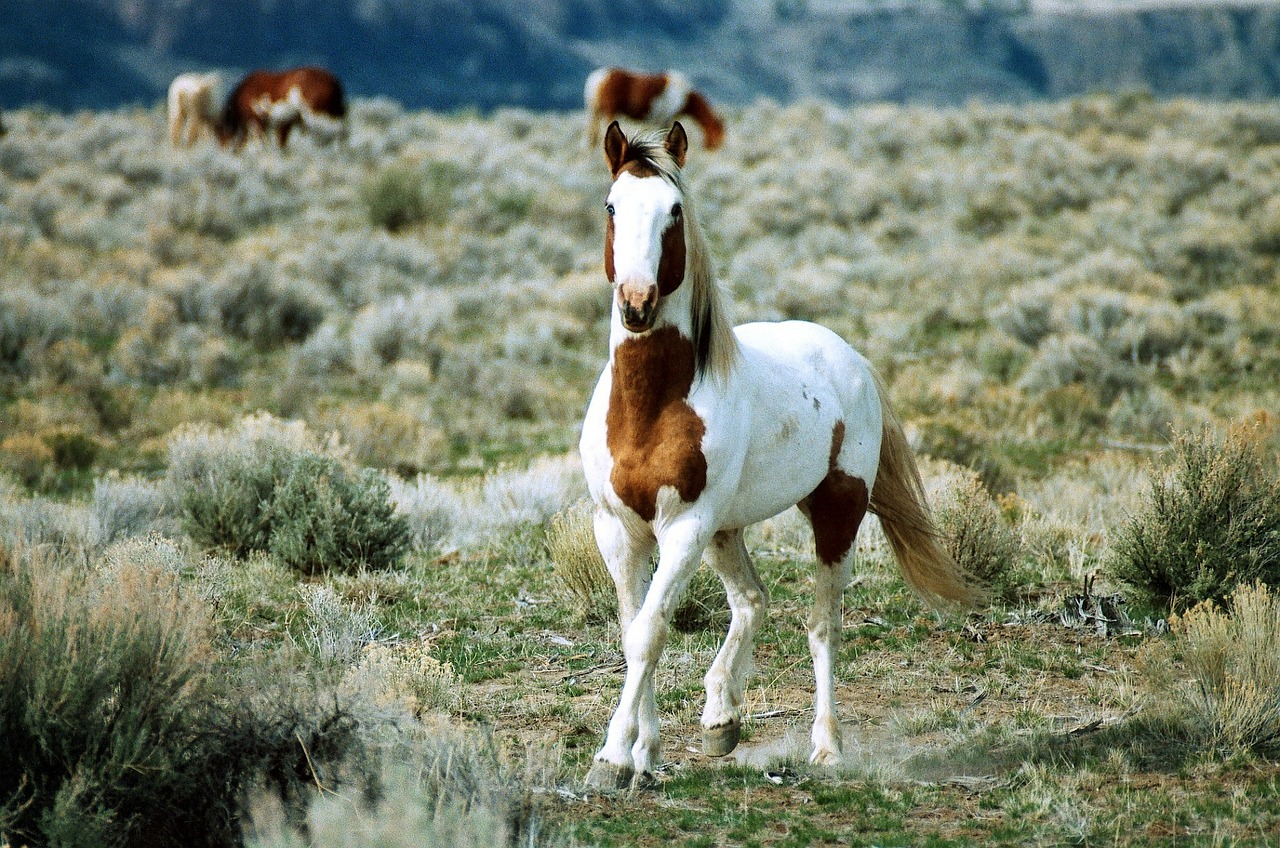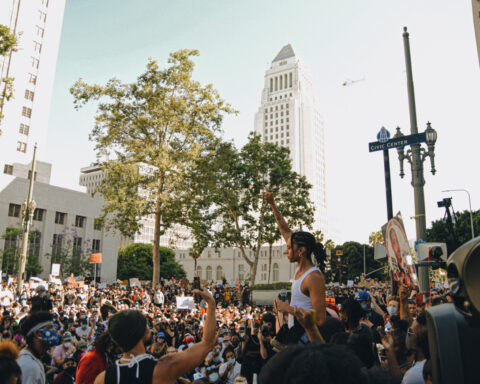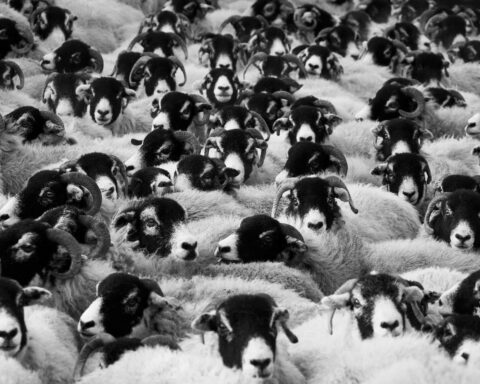By Dana Zee
On the wild lands of the western United States, free-roaming mustangs can still be seen thundering across the open range. These spaces, however, are growing fewer and farther between — and if powerful private interests have their way, they may disappear forever.
There’s an unseen battle taking place: wild horse advocates are entrenched in a war for the very survival of these animals and their right to live freely on land that was dedicated to them by the Wild Free-Roaming Horses and Burros Act, passed unanimously by Congress December 15, 1971. Who are the advocates fighting? The entire system, it seems.
This is a centuries-old conflict that goes back to the settling of the American West. It’s an embittered landscape; folks can be quick to judge and slow to change. In a few cases, families have held grazing allotments on public lands for generations. Mostly, though, public lands so-called “welfare” ranching today benefits the wealthy elite, private entities using it for a tax break. It also feeds a system of cronyism that is seemingly entrenched in American politics.
The Bureau of Land Management (BLM) is the agency tasked with “management” of the majority of this land and subsequently the wild herds. They are also responsible for maintaining the ecosystem and its health, which is suffering due to the effects of climate change, desertification, energy development and perhaps most of all, from centuries of grazing and land clearing needed for the exploitation of “farmed” animals for human consumption.
“The effects of livestock grazing — biodiversity loss, soil erosion, and water pollution — are cumulative rather than immediate,” according to the Foundation for Deep Ecology, “Few people realize that the desert washes they see across the Southwest were once lovely streams shaded by cottonwoods or willows, or that sagebrush-covered valleys in Montana may have had a nearly continuous cover of grass a century ago.”
The animal agricultural industry is one of the largest producers of misery on the planet. According to the UN report, Livestock’s Long Shadow, “The livestock sector emerges as one of the top two or three most significant contributors to the most serious environmental problems, at every scale from local to global.” It is a major contributor to climate change (at 18% of greenhouse gas emissions), more so than the entire transportation industry combined. In addition to environmental impacts, we must also consider the miserable lives of the 10+ billion land animals who suffer and die for human consumption each year.
It’s no longer a scientific question whether or not non-human animals are sentient beings. The fact that they experience emotions, feel pain, empathy, fear and grief is evident. What is also evident, is that humans cause incalculable suffering and wrongdoing to animals when we commodify them for human gain. This suffering is both direct and indirect; the effects are widespread and sometimes unnoticed. When cows are slaughtered for consumption, so are millions of coyotes, wolves, and other predators by government agencies to protect the “agricultural” animals. Another consequence is the capture and imprisonment of thousands of wild horses each year.
Wild horses and burros live on just 27 million acres of the roughly 245 million acres of public lands that BLM stewards — and they share that land and its forage with animals “farmed” by an industry that profits from their imprisonment and slaughter — all while being subsidized in these atrocities by our tax dollars.

In a process known as a “roundup”, mustangs are stampeded by helicopters, driven into traps and a life of captivity.
In a process historically known as a “roundup”, but now benignly re-branded as a “gather” by the BLM, mustangs are stampeded by helicopters, driven dozens of miles over uneven terrain into awaiting traps. They are captured by the hundreds, never to see freedom again. Helicopter roundups are inherently traumatic and injurious. As they flee for their lives, horses can panic, injure themselves, babies are run out of their hooves and pregnant mares spontaneously abort their foals.
Once captured, the traumatized animals are further stressed by being separated from their families and packed into crowded corrals. Broken necks and backs are not out of the norm, as wild-eyed horses crash full speed into steel panels, trying to clear fences in a manic last-ditch effort to escape confinement.
Contractors are paid by the horse, so while animal welfare “guidelines” exist, they’re loosely interpreted and even more loosely enforced. The horses are sometimes driven relentlessly in extremes of temperature. When it’s all said and done, hundreds, if not thousands, of once wild and spirited animals are carted away, forever to spend their life in a pen unless they happen to be among the small percentage that are “adopted out” — or sold each year.
The cost of all this misery? It has to be in the hundreds of millions of dollars over the half century since the 1971 Act was passed. Cattoor Livestock Roundup, one of BLM’s prime helicopter contractors, were paid over $20 million dollars from 2008-2018. Those fees don’t even include the annual cost of feeding and caring for the once-wild horses now in government-funded captivity.
The entire system is designed to keep citizens in the dark, uninformed and unaware. The government is spending millions to remove wild horses from the range for the benefit of a few wealthy playboy ranchers.
Over 50,000 once-wild horses and burros are currently living in “holding” pens as prisoners of our government. As a nation we are paying over $50 million dollars every year to feed and care for these captive horses and burros living out their life sentences, when they formerly lived for free on our open lands. These animals can live past the age of 30 in captivity, thus they are incarcerated for decades.
Why would the BLM — a government agency beholden to the people it is supposed to serve — participate in such absurdity? Especially when 80% of Americans want these animals protected from slaughter, a possible future that becomes more real as we remove more horses from the range where they live for free and as the cost of keeping them increases as a result.
One must ask who gains here? It’s certainly not the federally protected horses, the cows who will eventually be trucked to a terrified death in a far-away slaughterhouse, or the American public, whose money is being used to fund this gross fiscal negligence. So who is the hidden stakeholder?
BLM authorizes privately-owned, tax-payer subsidized animal agricultural corporations to operate on our public lands. By and large, these are not the idealized ma and pa ranchers living out the romanticized ideal of the American West. This is not Little House on the Prairie. This is the Koch brothers, Ted Turner, and the Hiltons, to name but a few. These are companies like Hewlett-Packard, doing it for entertainment, investment and tax subsidies. Who benefits? Like in every other place Americans seem to be getting shafted, the wealthy elite do.
The entire system is designed to keep citizens in the dark, uninformed and unaware. The government is spending millions to remove wild horses from the range for the benefit of a few wealthy playboy ranchers. Though public observation of roundups is technically allowed, the public observation area is often miles from the “trap”, so citizens cannot clearly see the injuries, the suffering and the death that result. If they could, if the nation could see the trauma that is inflicted on these beloved American icons, there would be massive public outcry.
Alas, wild horse and burro holding facilities are often closed to the public, with the exception of short-term holding facilities at specific adoption events. There is no accountability or oversight. BLM is running roughshod over due-process like an unruly child.
Is the mythology of the American West just that, a myth? We modern Americans are in love with the romantic idea of the American cowboy. It’s as if on some level we yearn for a time when life was simpler, when values and morals were strong and a hard day’s work left you fulfilled and happy.
But there’s a dark side to that romanticized ideal. The exploitation of animals has caused centuries of suffering for certain species labeled as “food”. It has devastated our western rangelands, robbing them of their resilience and their ability to support the myriad of species who call those lands home. It has resulted in the deaths of millions or predator animals, slaughtered to protect the “profitable” cows. And it has resulted in the removal and mass-incarceration of over 50,000 once-wild American mustangs.
This myth of the Wild West has been turned into an anti-wild horse PR campaign. It’s being used disingenuously by the BLM and others to rid public rangelands of our iconic wild mustangs. The nation is being sold a story that the West is overrun with wild horses, tearing up the land and driving wildlife away from resources. It would be laughable if it weren’t so sad.

Animal killed annually in the US to support supply for human consumption (animalclock.org)
The truth is that our government bows to the bidding of the animal agriculture industry who, for the sake of profit and greed, need federally protected horses removed.
The plight of the American mustang forces us to reconsider our antiquated ideas about land, nature, the Earth itself. We have a responsibility to be good stewards of the planet – for ourselves and all of the species we share it with.
As human beings, we kill over 10 billion lands animals every single year for human consumption. This issue runs so much deeper than just money and power. It speaks to the very core of what we’re doing all over the world – to wildlife, to the environment, to the Earth. It is time for a reckoning, before it’s too late, and our wild horses and myriad other species are lost forever.
Dana Zee is a contributing writer for Eon Magazine.
Latest from Eon
- Abolition as a Project of Deep DemocracySince the police murder of George Floyd on May 25, 2020, a stunning uprising against state violence has spread to more than 2,000 American cities. As protests continue across the country from Seattle to Washington, D.C.—and even in smaller cities like Kenosha, Wisconsin and Stamford, Connecticut—the political momentum endures.
- On electoralism, grassroots power and disability justiceRead our conversation with Justin Farmer, a long-time community activist running for state senate in Connecticut.
- In defense of abolishing the policeCriminal justice in the US has evidently not shed itself of the violent racism and Christian theocracy out of which it was built and attempts to reform it are polluted by corporate interests. Abolition, on the contrary, can direct us towards creating models of real public safety.
If you enjoyed reading this, help support us by sharing it with others.




